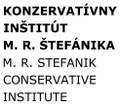
 Conservative Institute of M. R. Stefanik organized a lecture given by
Conservative Institute of M. R. Stefanik organized a lecture given by
Marko Mäki Hakola, Resarch Manager for Central Union of Agricultural Producers and Forest Owners,
on an issue of
Hosted by Radovan Kazda, analyst of agrarian and environmental policy for the Conservative Institute of M. R. Stefanik.
See Program of the Conference on Alternatives of Forest Business Development in the Slovak Republic below.
 Marko Mäki Hakola is the Research Manager of Central Union of Agricultural Producers and Forest Owners (MTK). Since 2005, Mr. Mäki-Hakola works with broad range of forest related issues: timber and forest industry product markets and export, profitability of private forestry, international affairs and Nordic cooperation, coordination of forest research and research policy. From 2001 to 2005, he worked as a researcher in the Pellervo Economic Research Institute (PTT) in Helsinki. Earlier Mr. Mäki-Hakola has worked as a trainee in the Forest Management Association, in the Forestry Center and in the Forest and Park Service.
Marko Mäki Hakola is the Research Manager of Central Union of Agricultural Producers and Forest Owners (MTK). Since 2005, Mr. Mäki-Hakola works with broad range of forest related issues: timber and forest industry product markets and export, profitability of private forestry, international affairs and Nordic cooperation, coordination of forest research and research policy. From 2001 to 2005, he worked as a researcher in the Pellervo Economic Research Institute (PTT) in Helsinki. Earlier Mr. Mäki-Hakola has worked as a trainee in the Forest Management Association, in the Forestry Center and in the Forest and Park Service.
Download the presentation here (1,3 MB).
General Partners:
and
Location: Congress Hall at Hotel Kultúra, Ružomberok, Slovakia
Date: November 7, 2006 from 9.00 AM
Language: Slovak (with the exception of lecture given by Mr. Marko Mäki Hakola in English)
Conference Program
09.00 – 09.05 AM: Opening of the Conference by Ondrej DOSTAL, Director of CI
09.05 – 10.45 AM: Block 1 – Forest policy and Entrepreneur Environment Development
Speakers:
10.45 – 11.00 AM: Coffee break
11.00 AM – 12.30 PM: Block 2 – Forest industry and state-ownership of forests
Speakers:
12.30 – 01.30 PM: Lunch
01.30 – 02.15 PM: Block 3 – Environmental regulations
Speakers:
02.15 – 02.30 PM: Coffee break, refreshments
Speakers (continue):
03.30 – 05.00 PM: Afternoon Break
05.00 – 06.15 PM: Block 4 – FME lecture (Lecture on Free Market Environmentalism)
Speaker:
06.25 – 06.30 PM: End of the Conference, Final word by Ondrej DOSTAL, Director of CI
06.30 – 00.00 PM: Banquet at the Hotel Kultúra
[1] Radovan KAZDA (Conservative Institute) – Forest Management Reform, Starting Points
Slovakia is among countries with high rate of governmental regulations of enterpreneurship in silviculture. Among the most important restrictions are: local taxes, environmental regulations, state-ownership of the forest, application of public interest and administrative restrictions of enterpreneurship. Our contribution is addressing the analysis of certain instruments of governmental policy (interventions), their impact on business sector and proposal of solutions for the area of public policy.
[2] Ivan KOLENKA (Union of Timber Processors) – Influence of the market liberalization on the development of business environment in wood processing industry
Slovakian wood processing industry is under pressure, which has an effect on its effectiveness (survival). It is energy demanding and the increase of energy price does have a serious consequences on the increase of expenses. Same thing could be said about the trend in the development of wages. In the last year alone the rise of price of wood together with strengthening of Slovak currency has caused significant drop-off in revenues and increase of costs. That is the reason why Slovakia should protect its internal wood market.
[3] Roman SVITOK (National Forest Centre) – Impact of state-owned forests on development of business environment
Slovak state forests ownership share has expressive changes in last 85 years. Share from 20% in 1920 through 92% in 1990 into 43% in 2005. Slovak state or municipal forests share is similar to Germany, Hungary, Switzerland, Japan and USA. State forest enterprise initiated creation of private firms for forest work by selling state production means to home entrepreneurs and orders a work at them. It was done in conditions where home firms and entrepreneurs had no accessible basic capital. State forests dominant position very expressive influence business sphere in logging, silviculture and forest protection. Private firms take part over 90% in the State forest work. State forests in Slovakia, they are guarantee market stability for wood processing industry, holders appropriate wood prices and they push state forest, environmental and social policy.
[4] Jiří OLIVA (Czech University of Agriculture) – SWOT Analysis state-ownership of forests
The State ownership of the forests belongs to important factors of the forest policy and it is a resource of conflits. Its position is exceptional, because it is the largest ownership, it works with big economic values and big volume of the financial resources. The report describes the main features of the ownership of the state forests, its historical evolution and by the help of the SWOT – analysis the report evalues up-sides and risks.
Key words: State, ownership of the state forests, swot-analysis, historical evolution, privatisation of the forests.
[5] Robert MARUSAK (Czech University of Agriculture) – Felling Potential in Slovak Republic
The paper deals with cutting regulation and cutting possibilities in Slovakia. It consists of three parts. The first part is aimed at brief description of the history and present state of cutting regulation in Slovakia. Present state and development of main elements, which affect cutting possibilities, are described in the second part. Namely these data are: forest area, forest categories, age structure of the forest, wood supply and increments. Environmental limits are not discussed in the paper as it is the aim of the paper of another conference participant. Development of total harvest in Slovakia since 1990 is described in the third part of the paper. On the base of actual age class distribution scenario of possible future harvest is presented as well.
Key words: forest management, cutting control, development
[6] Josef MLADEK (Liberal Institute) – Environment protection – What tools can be successful?
There is a general consensus among economists that property rights are essential for peace and prosperity in society. Moreover, the idea that secure and unrestricted ownership is crucial for efficient management of natural resources is increasingly being accepted even by governmental bodies and institutions sponsored by governments.
Foreign experience suggests, that private profit-oriented sector can provide environment protection services and outperform the governmental sector. Externalities cannot be used as a valid argument for imposing governmental regulation; instead externalities represent a challenge for entrepreneurs to search for innovative solutions. Key for the success of any private nature-conservation initiatives must be seen in removing artificial obstacles posed by state interventions. These can be often complex in their impact, difficult to identify, and the process of deregulation may be characterized by a strong opposition form the regulatory bodies and other stakeholders.
[7] Jaroslav SALKA (Technical University in Zvolen) – Impact of Environmental regulations on Felling potential in Slovak republic
This paper describes a relation between forestry and nature protection on the basis of economic and policy theories. The existence of nature protection as a public good and positive externality of forestry represents the economic nature of this relation. Nature protection is not a market subject so that it requires state interventions using a toll mix of forestry and environmental policy. Policy nature of this relation lays in the redistribution conflict of interested stakeholders. The aim of forestry coalition is to generate incomes from forest while ecological coalition aims at extensive nature protection. Integration and coordination of the relevant policies with stakeholders’ participation, discussion and negotiations can be used to solve this long-term problem.
[8] Jozef TUTKA (National Forest Centre) – Quantification of Compensations concerning industry restrictions in forests
Public-beneficial interests of the state and interest groups that influence the activities of forestry subjects are defined in the work. There are characterized main groups of restrictions on the management of forests and the substance of the algorithms of the determination of reimbursement. Current state of forests allocation for the protection of natural phenomena, components and whole forest complexes are presented. The effect of applying the tools of nature protection on the financial side of forest management and use is quantified. Annual amounts of required and paid reimbursement for the restriction on the use of wood producing forest function, as it follows from the law on nature and landscape conservation and other laws, are presented.
Key words: forest functions, public-beneficial, nature protection, protected area, reimbursement, detriment, logging, yield, management costs